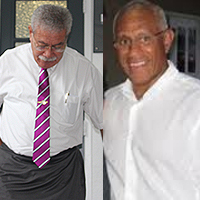Former Managing Director and Secretary of Fijian Holdings Limited, Sitiveni Weleilakeba will continue giving evidence in former Prime Minister, Laisenia Qarase=s Fijian Holdings trial this morning.
Weleilakeba took the witness stand yesterday afternoon and confirmed that the concept of FHL was imported from Malaysia and the person who did the research was Laisenia Qarase.
Weleilakeba confirmed that during his term as FHL Secretary, he was only a minute taker or record keeper.
He also confirmed that Qarase was a board of director of FHL from 1989 to 2000.
Upon questioning by FICAC's Senior Counsel, Michael Blanchflower, Weleilakeba confirmed that a director who has a vested interest in an entity that is discussed during a board meeting or a director who is a direct beneficiary from the discussions should declare their interest to the board.
He also said that he expects the declaration to be made if a director's family member has a vested interest.
He also said that if a declaration is made, it is recorded in the minutes.
Weleilakeba also said that the process was that the Chair would ask the director to then leave the meeting room.
He said that if a director abstained from voting, it would be recorded in the minutes however he did not come across any directors abstaining from voting.
Weleilakeba also said that a committee was set up in 1988 headed by the late Ratu Sir Kamisese Mara to prepare a nine point plan for FHL.
Ratu Mara was the Interim Prime Minister at the time.
Weleilakeba said that Qarase was one of the committee members.
Weleilakeba will continue giving evidence at 9.30am today.
Former Permanent Secretary for Fijian Affairs, Ratu Meli Bainimarama was the first FICAC witness in the trial.
Earlier yesterday:
FICAC's Senior Counsel, Michael Blanchflower said that Qarase allowed himself to be influenced by private interests that would benefit his family and fellow villagers.
Qarase is charged with 6 counts of abuse of office and three counts of discharge of duty with respect to property in which he has a private interest.
It is alleged that Qarase applied, and then facilitated and allowed the purchase of Class A FHL shares for certain companies when he was Director of FHL, Financial Advisor of the Fijian Affairs Board and Advisor to the Great Council of Chiefs.
The case relates to the allotment and issuance of the FHL shares to Cicia Plantation Co-op Society Limited, Mavana Investments Limited and Q-Ten Investments Limited.
While opening the case for the prosecution in a packed High Court room today, Blanchflower told the court that Q-Ten Investments is a company owned by Qarase's wife and children, Mavana Investments is a company owned by some of Qarase's family members and villagers where Qarase is from, while Cicia Plantation Co-op Society Limited is a company where Qarase was appointed as an advisor.
Blanchflower said their case will prove that between November 1991 and June 1992, Qarase on behalf of Q-Ten Investments, Mavana Investments and Cicia Plantation Co-op Society Limited applied for the FHL Class A shares, never declared his interest in those companies and participated in the decision making process.
The Senior Counsel for FICAC said the three companies own 20 percent of FHL and by far are some of the largest shareholders - Cicia Plantation Co-op Society Limited is the second largest shareholder while Mavana and Q-Ten Investments are the third largest shareholders in FHL.
Blanchflower said that from 1991 onwards the three companies received tens of thousands of dollars in dividends as Class A shareholders get a higher level of dividend payout.
Blanchflower said that this case is about established principles for public office holders and members of the public placing their trust on the person to carry out their duties for the benefit of the public at large.
He said FICAC's case will prove that Qarase did not adhere to these principles.
Qarase pleaded not guilty to all nine counts yesterday.
Stay with us for coverage of Qarase's trial.
Story by: Vijay Narayan

